In this article:
Oiling of the hair has been a conventional remedy for promoting hair health and growth for a long time now, although there is a risk of hair fall associated with this practice.
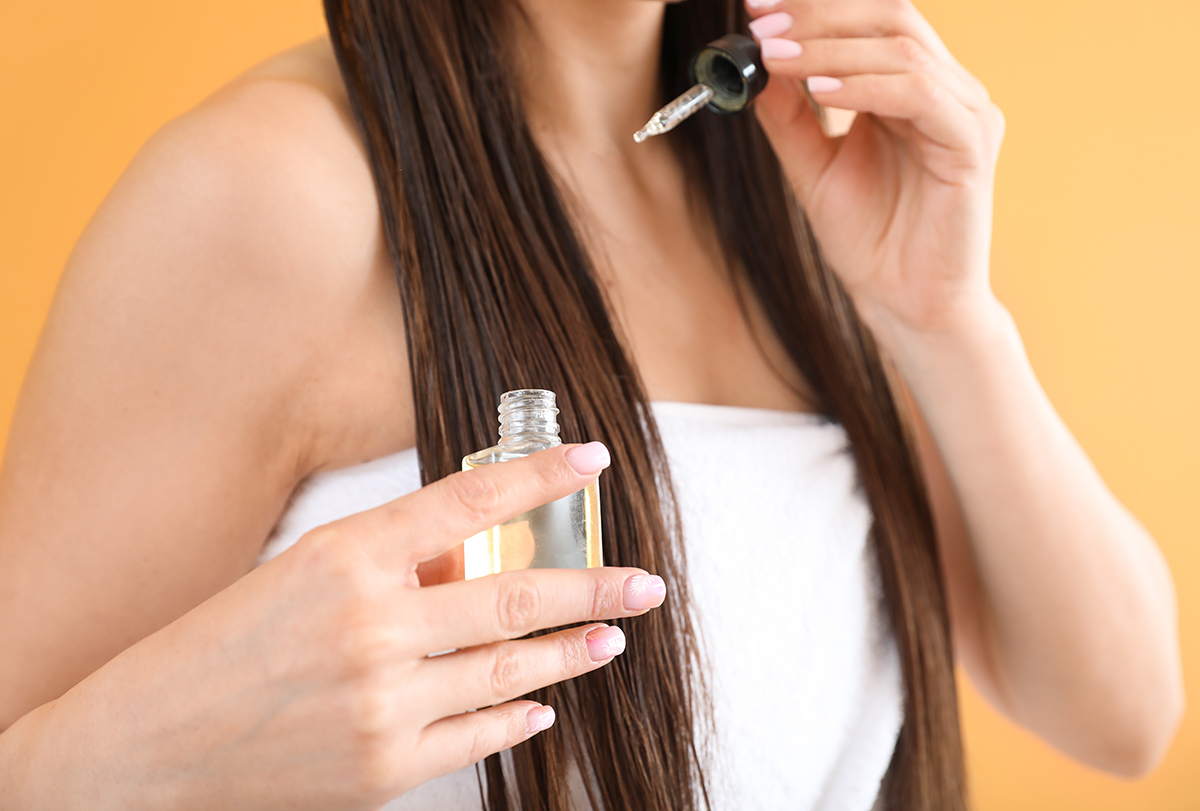
It is true that oiling can cause hair loss, but only if it is done improperly or excessively. The normal hair loss every day and during oiling varies from person to person.
Generally, it is considered normal to lose up to 100 hairs per day. However, losing more than this amount may be a cause for concern and should be addressed. (1)
Oiling Mistakes That Cause Hair Fall
Improper hair oiling techniques can lead to breakage or weakening of the hair strands, causing hair fall. Here are some mistakes that you might be making while oiling your hair:
1. Rigorously massaging the hair and scalp
According to experts, a vigorous massage can result in weakening of the hair roots. Relentlessly massaging the scalp with oil increases the friction between the hair strands, which leads to rapid breaking of the hair. Therefore, massage your scalp gently.
Moreover, oiling and massaging your scalp for long periods may weaken your hair and make it prone to breakage. A gentle scalp message for a few minutes after oiling the hair is enough for maintaining the well-being of your hair and scalp.
2. Wearing tight hairstyles
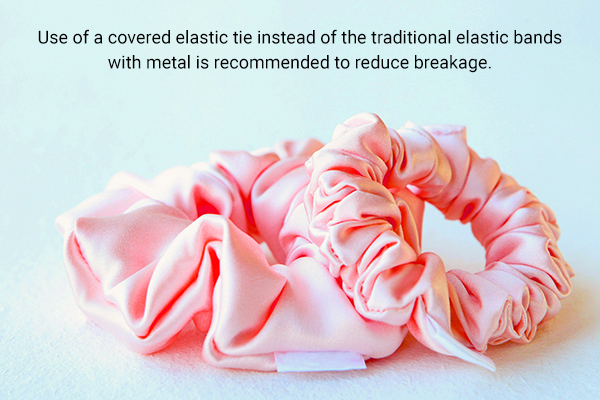
Clamping the hair tightly in a bun or braid after oiling can weaken the hair roots, causing a substantial amount of harm to your hair and leading to hair loss.
Extended pressure from tight hairstyles after oiling can cause traction alopecia in the long run as your hair is at its weakest when it is oiled. The tension from fastening up the hair too tightly can harm your hair strands. So, prevent excessive pulling of the hair while tying or braiding.
Also, the use of a covered elastic tie instead of the traditional elastic bands with metal is recommended to reduce breakage. (2)
3. Leaving the oil on for too long
Experts claim that letting oil sit on your hair for an entire night can disturb kapha and therefore should be avoided. Kapha dosha is one of the three main doshas of Ayurveda. It is described as the dosha responsible for the growth and maintenance of the structure. (3)
Ayurveda experts further share that you should not leave oil in your hair for more than 30–45 minutes. Hair should be washed after you’re done with the oiling as leaving the hair to soak in the oil for long durations can lead to a buildup of dirt and can make your hair greasy.
Oil may also attract dirt from the surrounding environment, which may worsen hair issues such as hair loss and related hair troubles. Oiling your scalp and leaving it overnight also increases the risk of developing dandruff and seborrhea, which can contribute to hair fall.
Moreover, experts suggest that if you wish to leave hair oil overnight, you should apply it to the ends of strands, avoiding your scalp. They explain that soaking the ends with oil is helpful to moisturize the hair.
4. Oiling an already oily scalp
Experts and cosmetologists advise that oiling regularly, especially if you have an already oily scalp, can be bad for your hair health.
This is because your scalp has sebaceous glands that secrete oil and sebum to maintain the smoothness of your scalp. So, natural oil plus the oil you put on your scalp can add up to be a lot!
An oily scalp is prone to skin conditions such as seborrheic dermatitis, and using hair oil can aggravate this problem. So, experts insist that oiling too often shouldn’t be an option for those with an oily scalp.
5. Oiling too much
According to hair experts, oiling your hair once or twice a week is good enough. If you have very dry hair, you can increase the frequency as needed.
6. Using the wrong oil
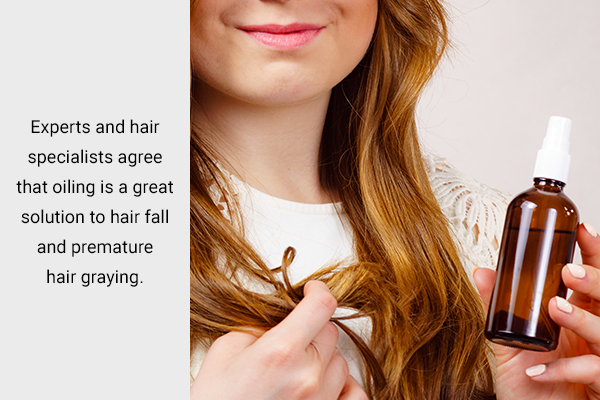
Experts and hair specialists agree that oiling is a great solution to hair fall and premature hair graying.
However, what you might not realize is that oils with a high molecular weight might be unable to infiltrate the scalp, thereby not doing much for your hair growth or health.
This is true for mineral oils as they do not penetrate the scalp very well due to increased capillary adhesion, leaving a thick film on the surface. This can attract dust and cause buildup and hair damage. (4)
How to Oil Hair Correctly?
Oiling your hair can be a great way to keep it healthy, shiny, and well nourished. To oil your hair correctly:
- Choose the right oil: The first step is to choose an oil that suits your hair type and scalp condition. Each oil has its own benefits and properties, so it is essential to choose the right one that works best for you.
- Warm the oil: It is recommended to warm up the oil slightly by placing the oil container in warm water for a few minutes. Warming the oil so helps it penetrate the scalp and hair better, say experts.
- Section your hair: Divide your hair into sections to ensure that you apply the oil evenly. Use a wide-toothed comb to detangle your hair before applying the oil.
- Apply the oil: Take a small amount of oil in your hands, and apply it to the roots of your hair, working your way to the tips. Gently massage your scalp for 5–10 minutes to improve blood circulation and promote hair growth.
- Leave it on: Leave the oil on for at least 30 minutes or overnight if you prefer. Cover your hair with a shower cap or a towel to prevent the oil from staining your pillow.
- Wash your hair: Wash your hair with a mild shampoo and conditioner to remove the oil. Rinse thoroughly with water to ensure that there is no residue left behind.
- Repeat: Repeat this process once a week or as often as needed, depending on your hair type and condition.
Remember not to overdo hair oiling, as excessive oiling can cause scalp irritation and hair loss. It is always best to start with a small amount and increase it gradually if needed.
In conclusion, oiling your hair can be an excellent way to nourish your hair and scalp. By following these simple tips, you can oil your hair correctly and achieve healthy, shiny hair.
Recommended Oils for Hair Care
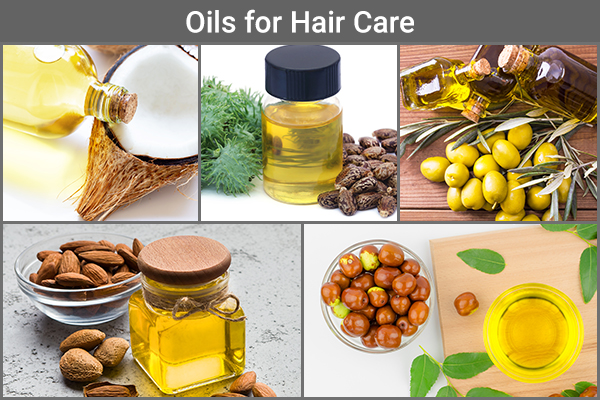
Several oils have been traditionally used for hair care and have shown beneficial effects on hair health. Here are some of the oils recommended by researchers and experts: (5)
- Coconut oil: Coconut oil is rich in fatty acids that nourish the hair and prevent hair breakage. It has been shown to penetrate the hair shaft and reduce protein loss from the hair, which can result in healthy, strong hair.
- Castor oil: Castor oil is abundant in ricinoleic acid, which has anti-inflammatory and antimicrobial properties. It has been traditionally used to improve hair growth and has been shown to increase hair density and thickness.
- Olive oil: Olive oil is replete with antioxidants and has been shown to improve the overall health and shine of the hair. It can also help to reduce dandruff and soothe an itchy scalp.
- Almond oil: Almond oil contains high amounts of vitamin E and has been shown to nourish and strengthen the hair. It can also help to prevent hair breakage and split ends.
- Jojoba oil: Jojoba oil is similar in structure to the natural oils produced by the scalp and can help to regulate oil production. It has been shown to moisturize the hair and scalp and help to prevent dryness and flakiness.
Coconut oil, castor oil, olive oil, almond oil, and jojoba oil are just a few of the oils that can be used for hair care, and each has its own unique properties and benefits. (5)
Benefits of Oiling Your Hair
Oiling your hair can provide numerous benefits, such as protection from environmental factors, moisturizing the scalp, preventing damage from heat and chemical products, exfoliating the scalp, and promoting hair health.
Hair oils can also provide some level of protection against UV damage due to their fatty acid content. Using hair oils that are rich in fatty acids such as oleic and linoleic acid can help protect the hair from UV radiation-induced damage and maintain its health and appearance. (6)(7)(8)
Other Reasons That Cause Excessive Shedding
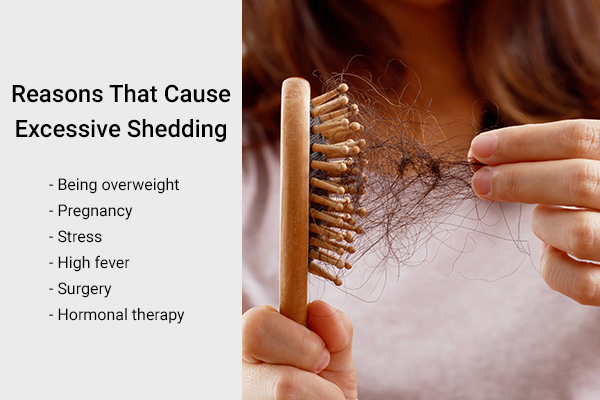
Excessive shedding of the hair or slow hair growth and regeneration can be observed in those who are: (9)
- Overweight or obese
- Pregnant
- New mothers
- Struggling with stress
- Suffering from high fever
- Straight out of surgery
- Taking hormonal therapy
Most-Asked Questions About Oiling Your Hair
Can I apply oil daily to my hair?
If you’ve dry hair, you can use oil more frequently to protect and nourish your hair strands, but if you already have an oily scalp, avoid oiling your hair daily.
Do I oil before or after washing my hair?
It is preferable to oil your hair before washing it. Let the oil sit for at least half an hour before washing it off.
Final Word
Hair oiling is a famous hair care practice. It has been supported by experts and also the generations that came before us.
Oiling provides nourishment and moisturization to the hair. However, it is only beneficial if done correctly; otherwise, it may lead to hair loss, hair breakage, and other problems.
Thus, improper hair oiling techniques may do more harm than good. So, you should know the right way to oil your hair to reap its benefits.
- Was this article helpful?
- YES, THANKS!NOT REALLY


